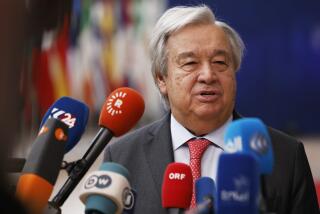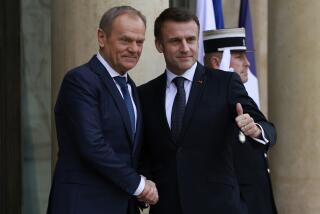EU leaders call on Moammar Kadafi to step down
Leaders of the European Union on Friday unanimously called on Libyan dictator Moammar Kadafi to give up power and said they would examine “all necessary options” to protect Libyan civilians from attack.
But the declaration did not move the 27-member bloc closer to intervening militarily in the conflict, despite urging by nations such as France and Britain to consider establishing a no-fly zone over the North African nation.
EU leaders were gathered in Brussels for an unusual emergency summit to discuss the events unfolding in Libya. The last time such a session was called was three years ago, over the war in Georgia.
In Libya, “the problem has a name -- Kadafi -- and he must go,” said Jose Manuel Barroso, president of the European Commission. “Time is running out, so we have to intensify our international pressure on the current regime to step down.”
The EU also said it regarded opposition leaders based in the eastern Libyan port city of Benghazi as credible political interlocutors. But it stopped short of adopting France’s decision to formally recognize the rebels as Libya’s legitimate authority and to exchange ambassadors.
That decision, announced by French President Nicolas Sarkozy on Thursday, caused some irritation among his fellow European leaders, who felt that Sarkozy had jumped the gun and acted unwisely. Although Sarkozy has called on other Western nations to follow France’s lead, none has done so. Indeed, Dutch Prime Minister Mark Rutte called it a “crazy move” by Paris.
Sarkozy defended the decision, saying the rebels were risking their lives to bring freedom to Libya and that their governing council in Benghazi deserved respect.
“Everyone agrees that it is a proper political interlocutor, and we should encourage it,” he told reporters in Brussels. “What choice did we have? What was the alternative?”
Sarkozy has also proposed limited airstrikes on military targets inside Libya to cripple Kadafi’s ability to attack rebels and protesters against his 41-year rule. Britain, too, has pushed for stronger action to protect the civilian population.
The EU did not discount that possibility in its statement Friday, but nor did it suggest that such an intervention would be imminent. Though all options remain on the table, any military involvement would have to have a clear legal basis and support from within the region, such as from the Arab League, EU officials said, echoing the position taken by the North Atlantic Treaty Organization.
“We must be ready to act if the situation requires it,” British Prime Minister David Cameron said.
The EU tightened its economic sanctions on Libya by freezing more assets belonging to the Kadafi regime and said it would offer more financial incentives to governments in the region to implement democratic reforms.
For his part, Sarkozy went into Friday’s summit under a cloud of criticism over his decision to grant diplomatic recognition to the rebel leadership in Libya.
Critics accused him of overcompensating for what was widely seen as too pusillanimous a response by France to the democracy movements in Tunisia and Egypt. Sarkozy is also fighting to reverse dismal approval ratings at home.
“France, totally outside the diplomatic scheme of things since the start of the Arab revolutions, now wants to be the country reminding Europe and the international community of its moral and humanitarian responsibilities in Libya,” the left-leaning newspaper Liberation said, adding: “Sarkozy wants at all cost to be seen to be the first to put on the costume of the president coming to the rescue and resolving the problems of the world.”
Special correspondent Kim Willsher in Paris contributed to this report.
More to Read
Start your day right
Sign up for Essential California for news, features and recommendations from the L.A. Times and beyond in your inbox six days a week.
You may occasionally receive promotional content from the Los Angeles Times.







